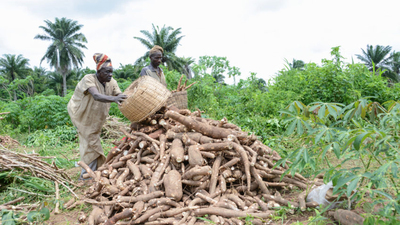Cassava farmers raise alarm over alleged land grabbing in Ekiti
By Joke Falaju, Abuja
The Nigeria Cassava Growers Association (NCGA) has raised an alarm over the alleged illegal occupation of 6,000 hectares of farmland in Ipao-Ekiti by the Agbeyewa Group of Companies, accusing the Ekiti State Government of fraudulently reallocating land that the association legally acquired.
Addressing a press conference in Abuja, the National President of the association, Mustapha Othman Bakano, stated that members of the association contributed money to purchase the land from the state government to support the establishment of an ethanol plant in partnership with the Nosak Group.
The association explained that the project, which involved the purchase of 6,000 hectares in Ipao-Ekiti and an additional 12,000 hectares in Kogi State, aimed to ensure a steady supply of cassava for processing.
According to the NCGA president, several government agencies, including the Ministries of Agriculture and Food Security, the Office of the Surveyor General, and the Environmental Protection Agency, participated in various stages of the project.
He noted that despite multiple meetings and official visits involving state officials and their partners, no objections were raised about the project until the Agbeyewa Group allegedly took over the land during a regulatory approval delay.
“We were awaiting a mandatory environmental clearance from the Federal Ministry of Environment when Agbeyewa Group moved onto the land. We eventually received the required approval on April 12, 2022, but by then, the group had already commenced operations illegally,” he stated.
Bakano warned prospective investors and institutions against engaging with Agbeyewa, stating that the land is currently the subject of litigation, with a case—Suit No. HCL/16/22—currently ongoing at the Ekiti State High Court.
Highlighting its commitment to community empowerment, Bakano disclosed that NCGA had already allocated 170 hectares of the 400 hectares cultivated to local youth and farmers in Ipao-Ekiti.
These allocations were facilitated by the state’s Agricultural Development Programme (ADP) to boost local participation in cassava farming for industrial use.
He lamented that the ongoing dispute jeopardises the prospects of industrialising the rural community through a project that could generate over 1,000 jobs and significant economic activity for the region.
He said the ethanol plant, projected to produce 150,000 litres of ethanol per day, will draw feedstock from cassava cultivated on the land. “To guarantee a viable market for cassava during glut years, we decided to establish processing factories. For this reason, the farmland was strategically acquired close to the proposed site of the ethanol plant,” he stated.
“It is unfortunate that through this misappropriation, the people of Ekiti State may be denied a major agro-industrial investment that had the active collaboration of key government departments,” NCGA stated.
Bakano, however, called on the Ekiti State government to return the 6,000 hectares of land to the association and also appealed to the association’s members to exercise patience, as the executives are working hard to resolve the issue.














